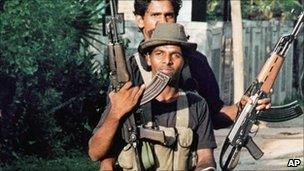Rights groups chastises Sri Lanka over rebel detentions
- Published

The ICJ says detention of nearly 8,000 former Tamil Tigers violates international conventions
The International Commission of Jurists (ICJ) says Sri Lanka has failed to adhere to international law in detaining suspected Tamil Tigers.
The watchdog says the detention of nearly 8,000 rebel suspects for months without a trial is perhaps "the largest mass detention in the world".
It urges Sri Lanka's donors and the UN to urge Colombo to improve its human rights situation.
It also questions the reasons for continuing the state of emergency.
The human rights watchdog says there is a "legal vacuum" over the detention of former Tamil Tiger "surrendees".
There has so far been no response to the report from the Sri Lankan government.
The ICJ says that the donor support for Sri Lanka "must be provided only on condition of compliance with international law and standards, or else risk complicity in a policy of systematic mass arbitrary detention".
The ICJ however recognised the progress made in terms of releasing displaced people from camps and in releasing 565 former child soldiers after rehabilitation.
The government argues that the threat posed by the Tamil Tigers still exists despite their military victory over them in May 2009.
It says it is important to keep the state of emergency until the process of vetting them is over.
Addressing the UN General Assembly last week, President Mahinda Rajapaksa called for a rethink of international rules governing the conduct of war.
But the watchdog questions the reasons for maintaining emergency regulations and the Preventing of Terrorism Act (PTA).
"Conditions on the ground cannot be considered to give rise to a threat to the life of the nation so far as to justify a state of emergency," the ICJ said.